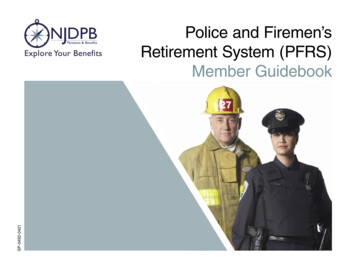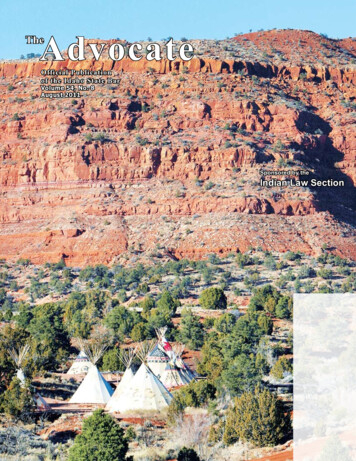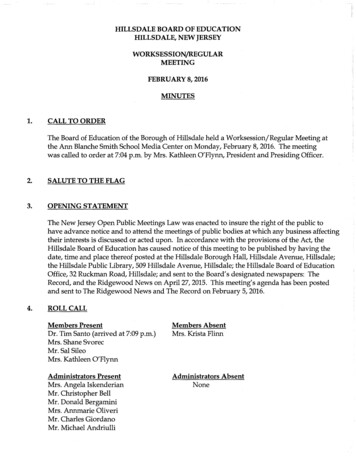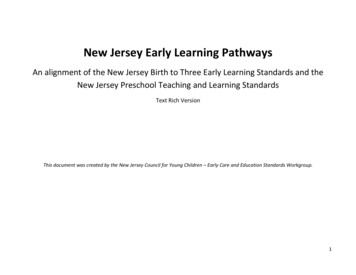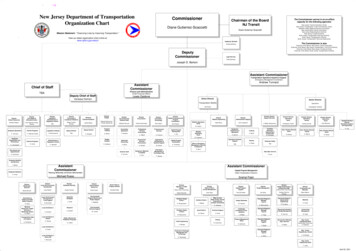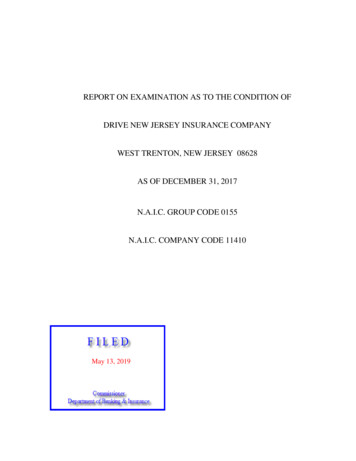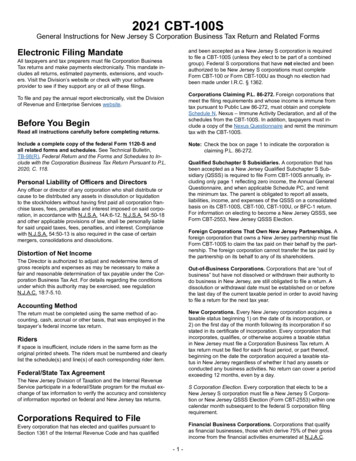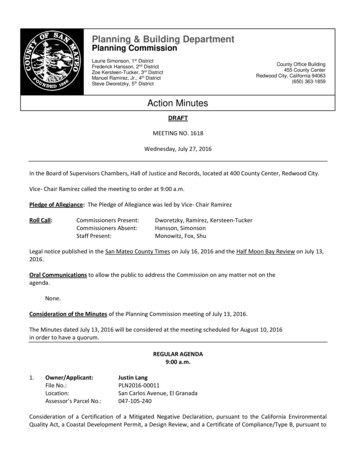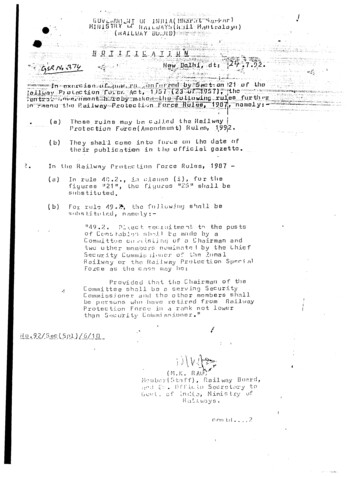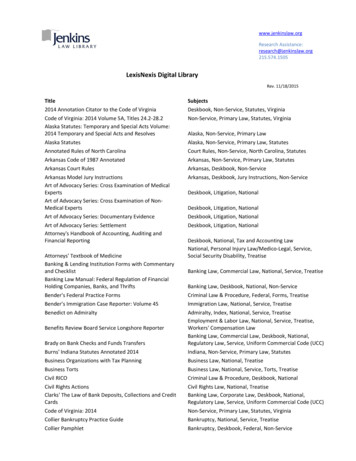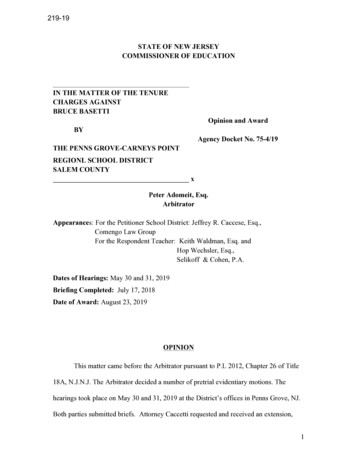
Transcription
219-19STATE OF NEW JERSEYCOMMISSIONER OF EDUCATIONIN THE MATTER OF THE TENURECHARGES AGAINSTBRUCE BASETTIOpinion and AwardBYAgency Docket No. 75-4/19THE PENNS GROVE-CARNEYS POINTREGIONL SCHOOL DISTRICTSALEM COUNTYxPeter Adomeit, Esq.ArbitratorAppearances: For the Petitioner School District: Jeffrey R. Caccese, Esq.,Comengo Law GroupFor the Respondent Teacher: Keith Waldman, Esq. andHop Wechsler, Esq.,Selikoff & Cohen, P.A.Dates of Hearings: May 30 and 31, 2019Briefing Completed: July 17, 2018Date of Award: August 23, 2019OPINIONThis matter came before the Arbitrator pursuant to P.L 2012, Chapter 26 of Title18A, N.J.N.J. The Arbitrator decided a number of pretrial evidentiary motions. Thehearings took place on May 30 and 31, 2019 at the District’s offices in Penns Grove, NJ.Both parties submitted briefs. Attorney Caccetti requested and received an extension,1
without objection, of one day, to July 17, 2019. No reply briefs were provided for. Afterbriefs were submitted, Attorney Wechsler on, behalf of Mr. Bassetti, filed a post-filingmotion to strike Charges Two and Three, which the Arbitrator denied. The Arbitratorobtained an extension to file the decision from August 16, 2019 to August 23, 2019.Both parties were represented by counsel and had a full opportunity to presentevidence, to cross-examine each other's witnesses and to make arguments in support oftheir respective positions. Neither party has raised any objection to the fairness of thisproceeding. Whether or not expressly referred to herein, the relevant evidence, theauthorities cited and the arguments set forth by the parties have been fully considered inthe preparation and issuance of this Opinion and Award.Tenure ChargesFollowing the statement of facts, the Board’s Charges contain these paragraphs.“Charge One, Conduct Unbecoming” lays out two incidents, incorporated byreference, from the statement of facts, one incident in the classroom, the other during theinterview/investigation jointly held by Middle School Assistant Principal Roy Wright, Jr.and Middle School Principal Dr. Luis Amberths. The classroom Charges allege:“[Statement of Facts] §6. Mr. Bassetti used the word “nigger”in his fifth (5th) periodscience class comprised of seventh (7th) grade students.[Statement of Facts] §7. More specifically, the students alleged that Mr. Bassetti quietlysaid to himself something to the effect of “I’m done with these niggers” or “I’m nottrying to deal with these niggers” while walking away from certain students who weredisruptive in the class.” [Emphasis added]Referring to the post-incident interview, Charge One alleges:2
[Statement of Facts] § 28. “Thereafter , in an effort to cover up his grossly inappropriateconduct, he made the situation worse when he explained that he could not have used theword “nigger” because the student to whom he was referring was white.”The Arbitrator was puzzled by paragraph§ 28. Assistant Principal Wright stronglyreacted to the words he attributed to Mr. Bassetti and abruptly ended the meeting, andthis was the source for this Paragraph § 28. It was among the charges relied upon bySuperintendent Zenaida Cobian in moving forward these proceedings. Assistant PrincipalWright’s explanation as to why he believed Mr. Bassetti’s words to be was an intolerableracial comment will be discuss later.Charge One goes on to allege:[Statement of Facts] § 30. “The use of any racial epithet by a teacher is intolerableThere is no place in a school district for such conduct. By making such highly sensitiveand intolerable comments, Mr. Bassetti has lost all credibility with both students andstaff, and, therefore, cannot continue to be employed by the Board.”Charge Two Incapacity,” incorporates the same facts as Charge One and statesin § 34 that “it is impossible for him to effectively return to the District” becauseit “would cause acrimony with student, staff and community.” Charge Two states[§ 35] that “Mr. Bassetti will not be able to perform the duties of his job if hewere to be returned to the District and, therefore, is incapable of continuing hisemployment with the District.”“Charge Three, Other Just Cause” incorporates the same facts as Charge Oneand states that returning Mr. Bassetti back to the classroom “would violate the public3
trust to ensure the District students’ care and well-being and that they are in a safeenvironment where they are not subjected to racial slurs by their teachers.”DiscussionThis termination is based on a single event, involving a single word – “n” - whichthe Board alleges and the Respondent denies saying in the course of a rambunctiousperiod five, seventh grade class.Mr. Bassetti (Respondent) is a tenured teacher employed by the District forfourteen years, since January 8, 2005, as a science teacher at the Penns Grove-Carney’sPoint Middle School. His record shows no previous discipline of any time, and noprevious accusations of the accused of the use of “the N Word,” on the job or off. Hetestified that when growing up, he used the “n” word, but stopped using it years ago.There is no evidence he makes racist comments to others. He has been a volunteer in thecommunity, assisting minority students. He holds all of his students to the same highstandards. Because the “n” word may be distracting in reading this Award, I haveshortened to “n”. “N” is, in the African-American community, simply “toxic” or moregraphically, as called in the Amazon.com review of a book1 on the word,“’the nuclear bomb of racial epithets,’ a word that whites have employed to wound anddegrade African Americans for three centuries”, and a word that can provoke in someAfrican Americans an immediate, visceral reaction. So when Assistant Vice PrincipalWright, during his investigatory interview with Mr. Bassetti, showed such a reactionwhen just discussing the word, it was understandable when placed in context of “n” long1The 226 page Book, titled “Nigger” and subtitled, “The Strange Career of aTroublesome Word” is by Randall Kennedy, a Professor of Law Harvard Law School.4
history of derision and insult. Whether his reactions damaged the investigation is anotherquestion, to be discussed later.On February 27, 2009, Mr. Bassetti was teaching a fifth period, seventh gradescience class. His testimony continues:I was sitting at my desk and the students were returning those corrected testsand I was going through them, and I noticed across the room that [Student 1] wasusing a Chromebook and it was teetering on top of his stuff.So across the room I said, please keep all Chromebooks flat on the table. Andhe looked at me and I gave it a minute or two and he refused. So I walkedover to him and I went to take the Chromebook from him and as I was [sic]reached out to take the Chromebook, he slowly slid the Chromebook to hisleft over to [Student 2] , out of my reach. [Emphasis added]Rather than cause any classroom disruption or engage [Student 1] in any way,I returned to my desk and continued with the test papers.And then I waited till the end of the class period and then students were bringingme their Chromebooks to check them back in and I noticed that[Student 1]had gotten up and was walking away from his Chromebook. And I asked him toplease, please bring me the Chromebook. And he said, “are you lazy, come get ityourself.”And that was as the bell had rung and I pretty much just smiled at him as hewalked out the door and he did a little double take and I wanted to leave himthinking that maybe there was going to be some discipline action [sic] for hiscomment. And then that's how I let him to [sic] walk out the door.Mr. Bassetti's prior written statement from the day of the alleged incident, February27, 2019, is consistent with this testimony. It states:Bassetti "asked [Student 1] to please put Chrome book flat on desk.[Student 1] refused. Went to take Chrome book and [Student 1] slid Chromebook to another student. At class end asked [Student 1] to return Chromebook, [Student 1] responded, 'Are you lazy, come get it yourself' “No othercommunication with [Student 1] during class period."The statements of the students varied in length, words used, with differences abouttime, place, and the comment. A number did write that they heard the word, “n.” One heard“n a.” Eight students heard nothing. To save hearing time and save these students fromtestifying that they heard nothing, Attorneys for the parties devised a creative solution.5
The students were at the District Office, many with a parent. The attorneys togetherinterviewed them one by one, in the absence of the Arbitrator, immediately before the start ofHearing Two. The attorney’s then stipulated that none of them would be called as witnessesbecause they heard nothing.Several students noticed details, unnoticed by the others, that solve the mystery ofwhy some students heard ‘n” but Mr. Bassetti denied saying it when at the investigationAssistant Principal Wright asked whether he said “n”, the grievant’s reaction as immediate,visceral, and emotional “No No No, adding words to the effect that made no sense becausethe student was “white.” He has consistently denied saying “n”.The answer to the puzzle is he doesn’t remember saying “n” because he said it “underhis breath”. He was not speaking to the class. He was speaking to himself. He was“mumbling’ “under his breath.” Student 3 so wrote on the incident report: “Me and [Student1] were siting down. Mr. Bassetti comes over to me and [Student 1] and tells [illegible] to do,me and [Student 1] he’d [said?] a smart remark back and Mr. Bassetti walked away andmumbled under this breath, ‘I’m done with these N***’” [Emphasis added].The Definition of the underline phrase: “If you say something under your breath,you say it in a very quiet voice, often because you do not want other peopleto hear what you are saying.Walsh muttered something under his breath.” Collins English Dictionary2These fleeting thoughts, self-articulated, are stored in short-term memory.3Persons reading this opinion will store the start of each sentence in short term memory tounderstand its meaning. When the parties read this Opinion, they will be using short termmemory .Long term memory stores experiences, which can be retained longer.4 Mr.234COBUILD Advanced English Dictionary. Copyright HarperCollins PublishersCollins English Dictionary. Copyright HarperCollins Publishers.“That section of the memory storage system in which experiences are stored on asemipermanent basis.” Collins English Dictionary. Copyright HarperCollinsPublishers6
Bassetti was able to recall what happened in the classroom because he experienced it. Heremembered not trying to provoke a confrontation. Not remembering what he said tohimself is understandable and hardly unusual.[Student 3] was sitting right next to Student 1, the provocateur, and Mr. Bassetti, andin a good position to see and hear the incident, and had the experience and vocabulary todescribe it as mumbling to himself under his breath.Other student’s observations were similar to [Student 3’s] version. These studentsused their own vocabularies. [Student 3] wrote: “We were doing our work kids where[sic] loud and very quietly Mr. Bassetti [sic] said “nigger” and I thought he did not reallysay it but my classmates heard him say it.” [Emphasis added] [Student 4] wrote thatStudent 4 and another student were turning off the chrome book and Mr. Bassetti, saidthe n word very softly.” Student 5 wrote [two students] were turning off the chrome bookand Mr. Bassetti [sic] said the n word softly. [Emphasis added]From this I conclude that Mr. Bassetti was not lying when he denied saying “n”.Lying is knowing at the time you make it that your statement is false.5 He cannot bepunished for lying when saying something that he mistakenly believes to be true.The Petitioner’s arguments in favor of disregarding all of the student statementsare not persuasive. The Arbitrator has considered the student testimony with great caution.The Arbitrator is not persuaded that the low grades Mr. Bassetti issued to some of thesestudents motivated them to invent their stories.6 Some were uncertain about hearing whetherhe said, “n”. They talked about it in the halls after his class: “Did you hear it?” This is not5See Black's Law Dictionary Free Online Legal Dictionary 2nd Ed. {Perjury defined.]Mr. Bassetti assigned a science project to all of his students, setting the same highstandards for all of them. Those who did not do the assignment, or could not complete itafter extensions, knowing it counting for 30% of the grade, got low grades coincidentalwith this incident. After submitting the low grades for the project, and after hissuspension with pay pending this arbitration, Mr. Bassetti discovered that someone hadsubstituted a new grade: “E” for “Excused.” That raised the grades.67
the same as a conspiracy to lie about it. (One student, who was out of class, later wrote abouthearing it. Two others were considered not credible. None of the three testified.) The studentwritten statements varied widely in some details – time of day, location, words used.Common to the statements of students in a position to hear was the word, “n.”The Respondent contends, also in the alternative, that the other stated reasons fortermination are without merit. They are the subjects of the rest of the Opinion.Part Two of Charge One is the investigation, which the Petitioner contends wasunfair and filled with errors. The Board contends otherwise. The Arbitrator finds that thePetitioner’s contentions have merit. Even without these deficiencies, the part of the chargedealing with Mr. Bassetti’s statements during the meeting are on its face, illogical, and notbased on any reasonable interpretation of what Mr. Bassetti said.The Regional School District rules and normal practices required the matter tohave been assigned to Affirmative Action, who was Dr. Michael Ostroff, but he was out oftown that day on school business. So the matter was assigned to Assistant Principal Wright.There then followed a series of events that the Respondent contends undermined the results.Assistant Principal Wright was not the proper investigator - it should have been assigned tothe District’s Affirmative Action Officer, Dr. Michael Ostroff, who signed off on the reportbased on the student’s written statements obtained by Assistant Principal Wright.But the two most serious deficiencies in the Assistant Principal’s Investigation wasfirst, when he summoned Mr. Bassetti to an investigatory interview which could lead to (anddid lead to) discipline and Mr. Bassetti was denied Union representation. And second, thathe did not recuse himself when it became evident that he was so deeply and emotionallyinvolved that it impaired the investigation and his judgment and led to the filing of anillogical complaint about what Mr. Bassetti did not say during the interview, but Mr. Wrightclaimed he implied.Charge One states in relevant part:8
“Thereafter , in an effort to cover up his grossly inappropriate conduct, he madethe situation worse when he explained that he could not have used the word ““nigger” because the student to whom he was referring was white.”This Charge makes no sense. Mr. Bassetti had a right to defend himself. Byinferring an unstated and illogical meaning, the Board has interfered with the right todefense. For example, if a teacher denies a charge during an investigatory interview, andis hit with an additional charge of lying, then what purpose would be served with havingthe interview in the first place? And what if the teacher was not lying? If these were theground rules, then the purpose of the interview – to allow the employee to have his or hersay, so the employer would know both sides - would be defeated.Mr. Wright claimed that, after informing Mr. Bassetti of the allegations, Mr. Bassettiasked who the student was towards whom he allegedly used the "N" word. Mr. Wright’sanswer was, “ [Student 1]”. Mr. Bassetti allegedly responded "I couldn't have called him thatbecause he's white." Hearing this, Mr. Wright testified, “I became extremely angry, just putmy head down and told. . . Mr. Bassetti that I found his response to my question on its ownmerits to be offensive. And I said, ‘The meeting will now end.’"The following explains why the Arbitrator upon reading the Charges, could notunderstand it. Mr. Wright explained that he interpreted Mr. Bassetti's alleged response tomean that "[using the 'N' word] would have been justifiable had it not been a white studentthat he said that to or because it was a white student that he couldn't have possibly said theword. And like I said, [that] just didn't put me in a good place."The argument is absurd and contrary to the rules of logic. Mr. Bassetti never said thathe would have used the “n” word if the student were black. Nor did he infer it.Deconstructing why it is illogical, here is the false syllogism: Mr. Wright has constructedand them laid upon Mr. Bassetti a false argument. “Illogical” means not following the rulesof logic. This is why:Major premise: Mr Bassetti calls African Americans “n”.9
Minor premise: [Student 1] is not African American.Conclusion: Therefore Mr. Bassetti did not call [Student 1] a “n”.Mr. Wright has constructed the major premise out of whole cloth and attributed it toMr. Bassetti. It’s a verbal slight of hand, arising out of feelings, creating a denial into anadmission. Creative, but not valid. This part of Charge Two is without merit.And because it found part of the foundation for Principal Cobain’s decision toembrace it and refer it to the Board of Education, it seriously impairs the Principal decisionand the Board’s.Superintendent Cobain accepted Mr. Wright’s implied inference as being anadmission by Mr. Bassetti that he would use “n” against African-Americans.Superintendent Cobian then mischaracterized Mr. Wright's version of his interview with Mr.Bassetti as unfavorable to Mr. Bassetti on direct examination. Referring to "concerns thatMr. Bassetti ha[d] said, if it would have been a white student, I would have not said it [sic],implies that he will not use it against a white [sic], but he will use it against a black [sic]"The Superintendent inserts a newly invented sentence using the subjunctive verb “wouldhave”: “If it would have been a white student.”The Superintendent attributes to Mr. Bassetti words he did not say to create aconclusion he did not make.The Respondent contends that additional defects in the investigation voided theprocess, That Assistant Principal Wright was “investigating” was established by credibleevidence. Dr. Michael Ostroff, the district's Affirmative Action Officer who wrote theinvestigation report, but did not conduct the student’s investigatory interviews, as he was outof district on a training session, and was not aware of the situation until after the weekend,and was not present for any of the investigatory interviews with the students or with Mr.Bassetti. Dr. Ostroff stated that "[i]t was a judgment call. By that time . . . the kidshad been interviewed by administration. I had received the statements in PDF form from the10
Superintendent. I was able to review those and felt at that time that the students' statements,along Dr. Ostroff accepted Mr. Wright’s conclusions without questions and withoutinterviewing Mr. Bassetti.The Resondent contends these are serious defects that call the result into question.The Arbitrator agrees.The respondent states that the Board denied Mr. Bassetti his right to Unionrepresentation at the investigatory interview with Assistant Principal Wright andPrincipal Amberths. The Arbitrator agrees.Mr. Bassetti testified that Principal Amberths "told me I did not require unionrepresentation for this, I needed to make a statement" and thus slammed shut the Unionrepresentation door. And that, when Mr. Wright testified that Mr. Bassetti never asked forand was never denied union representation, Mr. Wright was incorrect. A violation of anemployee's Weingarten rights "is not harmless error or a formality." On the contrary, it iswell-recognized that "[r]equiring a lone employee to attend an investigatory interview whichhe reasonably believes may result in the imposition of discipline perpetuates . . inequality [ofbargaining power between employees and employers], and bars recourse to the safeguardsthe[National Labor Relations] Act provided 'to redress the perceived imbalance of economicpower between labor and management.'" N.L.R.B. v. J Weingarten, Inc., 420 U.S. 251, 262(1975) (quoting Am. Ship Bldg. Co. v. N.L.R.B., 380 U.S. 300, 316 (1965)).The New Jersey Supreme Court extended the Weingarten rule to New Jersey publicemployees, writing:an investigatory interview of an employee often entails an atmosphere ofisolation and intimidation .In such a setting, employees may be less thanarticulate in attempting to defend themselves. Employees may not realizethat they could exonerate themselves through recounting to the employercertain mitigating circumstances. Thus, an employee's defense may be lessthan compelling, squandering the last chance of exculpation beforepunishment is delivered. Matter of Univ. of Med. & Dentistry of New Jersey (Sch. ofOsteopathic Med.), 144 N.J. 511, 528 (1996).11
Charge Two Incapacity,” incorporates the same facts as Charge One and statesin § 34 that “it is impossible for him to effectively return to the District” because it“would cause acrimony with student, staff and community.” Charge Two states [§ 35]that “Mr. Bassetti will not be able to perform the duties of his job if he were to bereturned to the District and, therefore, is incapable of continuing his employment.”The Charge is without merit. The Arbitrator has found that Mr. Bassetti, whilespeaking to himself softly under his breath, used “n”. To uphold this termination wouldcreate a new common law of teacher termination: “If you so much as breathe to yourselfthe word “n”, with no intention to communicate it to others, but are overheard by somestudents, even if you never intended them to hear, even if you have never said “n” tostudents in 14 years, your intent is irrelevant, and your spotless record is irrelevant, andyou shall be terminated for the first offense.”First, The New Jersey legislature set up a statutory plan to balance the needs ofSchool Districts for competent teachers, and the needs of teachers to be treated fairly, andcreated a panel of experienced arbitrators to adjudicate these disputes. The Board’sargument here would transfer that power directly to the School Boards or the public, andthat their decision, not the arbitrator’s, shall be final and binding.Second, the Arbitrator is aware of the facts of this case, because of the hearingwith witnesses and cross-examination. The public is not so aware. Misinformation,rumor, innuendo can run rampant in any community. Especially where, as here, anindividual has tried to influence Board decisions, regularly calling out for the terminationof teachers, includint Mr. Bassetti. In the Bassetti matter, a parent of a student whocame home and reported that Mr. Bassetti said “n”, called a local television station thatsent over a reporter, and interviewed the student about this matter. The matter as alsoreported in local newspapers. The legislature never intended to dispense with an orderlyhearing under strict safeguards and turn terminations over to the press and the public.Charge Two is without merit.12
“Charge Three, Other Just Cause” incorporates the same facts as Charge One andstates that returning Mr. Bassetti back to the classroom “would violate the public trust toensure the District students’ care and well-being and that they are in a safe environmentwhere they are not subjected to racial slurs by their teachers.”Charge Three is without merit.Mr. Bassetti did not direct his comments outward. He was saying softly under thisbreath to himself, not the students. Reinstatement would not violate the public trust. Nostudent said he or her was unsafe. Mr. Bassetti.Under (TEACHNJ Act), L. 2012, c. 26 (N.J.S.A. 18A:6-117 to -129), fact-finder ina tenure hearing involving allegations of misconduct should consider, when determining theappropriate penalty, "the nature and gravity of the offenses under all the circumstancesinvolved, any evidence as to provocation, extenuation or aggravation, and . . any harm orinjurious effect which the teacher's conduct may have had on the maintenance of disciplineand the proper administration of the school system." In re Fulcomer, 93 N.J. Super. 404, 422(App. Div. 1967) Other factors to be considered include "the impact of the penalty on [therespondent's] teaching career"; the respondent's "teaching record . . and teaching ability"; andwhether the respondent "had . . . been disciplined in any manner by the board prior to the dateof the incident[s] involved in [the] charges." Id.The Charges relate to a single incident, not a pattern of misconduct. His conduct willhave no harm or serious effect on the maintenance of discipline or the school system. Itleaves open the ability of the District to discipline other teachers for direct and open andintentional verbal belittling of students. No student was injured. He did say it to the students.He made the comment under his breath under provocation from a student who refused hisrequest to move the Chrome Book off the pile, challenged his authority, called him “lazy”,and when Mr. Bassetti walked over to take the Chrome Book, the student slid it over toanother student. At the same time, Mr. Bassetti was trying to control other students and hadto raise his voice. (This was the seventh period of the day. The students had been in school13
for a long time. )The impact on Mr. Bassetti’s career would be devastating. He has good teachingability, has good evaluations, is initiates regular contact with parents of struggling students,tries to help the students improve, hold all students to high standards, sets limits and adheresto them, and encourages students to meet the standards, regardless of background. Prior tothis event, his record shows no discipline.The incident was not premeditated. He did not intend for his thoughts expressed tohimself be heard by students; he did not intend to communicate to students. He was mutteringto himself, under his breath.The contentions advanced by the Board are not persuasive. I have addressed most ofthem and need not repeat them. I disagreed with the Board’s assessment of the facts and theimplications from those facts.Mr. Bassetti had no obligation to respond at the meeting to the Superintendent. Therewas nothing left to say. The result had already been reached. His Union representative toldhim to stay silent.The Arbitrator rejects the Board’s contention that they proved each element of theircase against Mr. Bassetti, as discussed previously. The Arbitrator rejects the Board’scontention that Mr. Bassetti engaged in unbecoming conduct.The Arbitrator rejects the Board’s argument that Mr. Bassetti lacks credibility, forreasons explained in detail in this Award.The Arbitrator rejects the Board’s contention that Mr. Bassetti cannot continue hisemployment. He has had a spotless record for 14 years. He was good evaluations.Balancing all of these factor, discharge is too severe, disproportionat to the offense.Mr. Bassetti did not engage unbecoming conduct. Mr. Bassetti is not a racist. The Board didnot have statutory cause, including just cause, to terminate him.14
AWARD AND REMEDYThe District has failed to establish any of the charges as sufficient grounds fortermination against the Respondent. Accordingly, the tenure charges are dismissed.As a remedy, the District is ordered to remove the dismissal from Bruce Bassetti’s record.It is further ordered to immediately reinstate him to his former position, or to acomparable position mutually agreeable to the parties, without loss of seniority. It isfurther ordered to make Bruce Bassetti whole for losses, if any, incurred as a result of hisdismissal.The Arbitrator shall retain jurisdiction of the case for the sole purpose of resolving anydispute over the implementation of the remedy.Peter Adomeit, Arbitrator 8/23/1915
STATE OF NEW JERSEYCOMMISSIONER OF EDUCATIONxIN THE MATTER OF THE TENURECHARGES AGAINSTBRUCE BASETTIOpinion and AwardBYAgency Docket No. 75-4/19THE PENNS GROVE-CARNEYS POINTREGIONL SCHOOL DISTRICTSALEM COUNTYxI, Peter Adomeit, affirm that I am the individual who executed this Decision and Award.Peter Adomeit, Arbitrator 8/23/1916
hearings took place on May 30 and 31, 2019 at the District's offices in Penns Grove, NJ. Both parties submitted briefs. Attorney Caccetti requested and received an extension, 219-19. 2 . since January 8, 2005, as a science teacher at the Penns Grove-Carney's Point Middle School. His record shows no previous discipline of any time, and no
